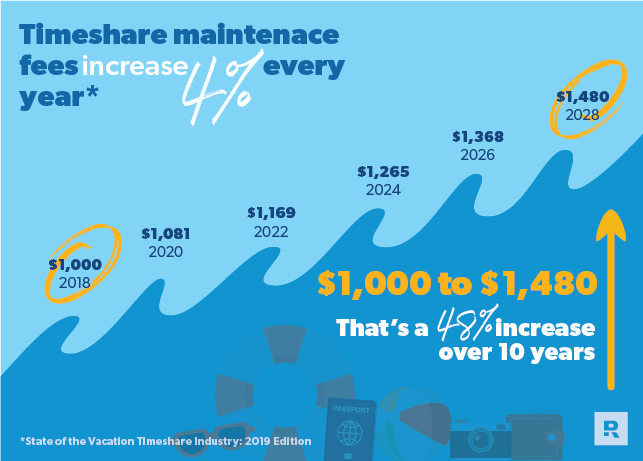Each purchaser usually acquires a particular duration of time in a specific unit. Timeshares normally divide the property into one- to two-week periods. If a purchaser desires a longer period, purchasing numerous successive timeshares may be an alternative (if readily available). Conventional timeshare residential or commercial properties normally offer a set week (or weeks) in a property.
Some timeshares use "flexible" or "floating" weeks. This arrangement is less stiff, and enables a buyer to select a week or weeks without a set date, but within a particular period (or season). The owner is then entitled to book his/her week each year at any time throughout that time period (topic to availability).
Because the high season might stretch from December through March, this provides cost of timeshare the owner a little bit of holiday flexibility. What sort of residential or commercial property interest you'll own if you purchase a timeshare depends on the kind of timeshare bought. Timeshares are typically structured either as shared deeded ownership or shared leased ownership.
The owner gets a deed for his/her portion of the unit, specifying when the owner can use the residential or commercial property. This implies that with deeded ownership, numerous deeds are issued for each home. For example, a condo unit sold in one-week timeshare increments will have 52 total deeds when totally offered, one provided to each partial owner.
Each lease contract entitles the owner to use a specific residential or commercial property each year for a set week, or a "drifting" week throughout a set of dates. If you purchase a rented ownership timeshare, your interest in the home generally ends after a particular regard to years, or at the current, upon your death.
This suggests as an owner, you might be limited from offering or otherwise moving your timeshare to another. Due to these aspects, a rented ownership interest may be acquired for a lower purchase price than a comparable deeded timeshare. With either a leased or deeded kind of timeshare structure, the owner purchases the right to use one specific residential or commercial property.
To use higher versatility, lots of resort developments participate in exchange programs. Exchange programs make it possible for timeshare owners to trade time in their own home for time in another participating home. how to rent a timeshare. For instance, the owner of a week in January at a condominium unit in a beach resort may trade the property for a week in a condo at a ski resort this year, and for a week in a New York City accommodation the next.
10 Easy Facts About How To Get Out Of A Timeshare Presentation Shown
Typically, owners are restricted to picking another home categorized comparable to their own. Plus, additional costs are common, and popular homes might be tricky to get. Although owning a timeshare methods you will not need to throw your cash at rental lodgings each year, timeshares are by no methods expense-free. First, you will need a piece of money for the purchase price.
Since timeshares seldom preserve their value, they won't receive financing at a lot of banks. If you do find a bank that consents to fund the timeshare purchase, the rates of interest makes certain to be high. Alternative financing through the designer is normally offered, however again, just at high interest rates.
And these charges are due whether or not the owner uses the residential or commercial property. Even worse, these charges commonly intensify constantly; in some cases well beyond a cost effective level. You might recover a few of the expenditures by renting your timeshare out throughout a year you don't use it (if the rules governing your specific home enable it) - what is a timeshare.
Purchasing a timeshare as a financial investment is hardly ever a good concept. Because there are a lot of timeshares in the market, they hardly ever have great resale capacity. Instead of The original source valuing, many timeshare diminish in value once purchased. Many can be difficult to resell at all. Instead, you need to consider the value in a timeshare as an investment in future holidays.
If you vacation at the very same resort each year for the exact same one- to two-week period, a timeshare might be a terrific method to own a property you love, without sustaining the high expenses of owning your own house. (For information on the expenses of resort home ownership see Budgeting to Buy a Resort House? Expenditures Not to Overlook.) Timeshares can likewise bring the comfort of knowing just what you'll get each year, without the trouble of scheduling and renting lodgings, and without the fear that your favorite location to stay won't be offered.
Some even offer on-site storage, allowing you to easily stash equipment such as your surfboard or snowboard, avoiding the trouble and expense of carting them back and forth. And just since you may not utilize the timeshare every year does not indicate you can't take pleasure in owning it. Numerous owners enjoy regularly loaning out their weeks to pals or relatives.
If you don't want to getaway at the same time each year, versatile or floating dates provide a nice choice. And if you wish to branch off and explore, consider utilizing the property's exchange program (ensure a great exchange program is offered before you purchase). Timeshares are not the very best solution for everyone.
Some Known Facts About How Do I Sell A Timeshare.

Also, timeshares are typically unavailable (or, if available, unaffordable) for more than a few weeks at a time, so if you normally vacation for a 2 months in Arizona throughout the winter season, and invest another month in Hawaii throughout the spring, a timeshare is most likely not the finest alternative. Additionally, if conserving or making cash is your top concern, the lack of investment capacity and ongoing costs included with a timeshare (both gone over in more information above) are certain downsides.
Does the phrase "timeshare" ring a bell, however you don't understand what a timeshare is? Or maybe you have an unclear concept of what a timeshare is however want some more thorough info on how a timeshare works. In basic terms, a timeshare is a resort system that allows owners to have an increment of time in which they can use for getaways every year.
This ownership is generally in weekly increments. A lot of timeshares today are with large corporations like Wyndham, Marriott and even Disney. These hospitality brands offer a travel club design of subscription for owners, providing flexibility and customization for getaways. According to the American Resort Development Association, "timesharing" is specified as shared ownership of here a holiday home, which might or may not include an interest in real estate.

These increments are typically one week however differ by developer and resort. Generally, you are sharing a system with others, however "own" an appointed week. There are a couple of prominent people that offer timeshare a bad rep, however pleased owners and stats collected by ARDA's AIF Structure disprove viewpoint. In fact, the AIF State of the Getaway Timeshare Market Reveals Development - how to get out of a timeshare contract.
If you're a timeshare owner or seeking to Purchase Timeshare, you must end up being familiar with your vacation ownership brand, due to the fact that every one works in a different way. The most common (and now obsoleted!) way a timeshare works is owning a particular week at the same time every year, in the same resort. Typically, households can travel to their timeshare resort throughout their "set week." Nevertheless, there are many more alternatives to timeshare than ever.